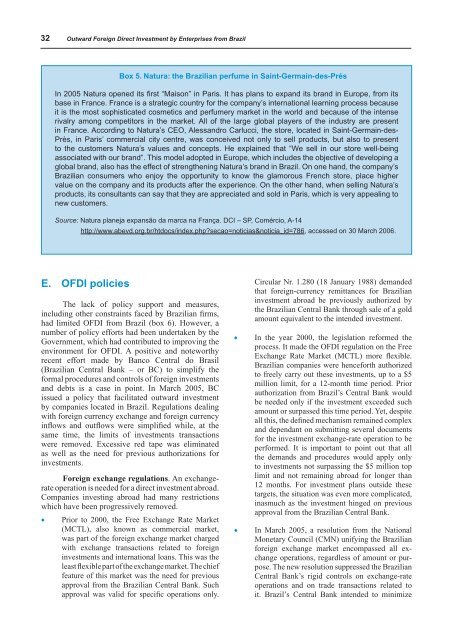Global Players from Emerging Markets: Strengthening ... - Unctad
Global Players from Emerging Markets: Strengthening ... - Unctad
Global Players from Emerging Markets: Strengthening ... - Unctad
Create successful ePaper yourself
Turn your PDF publications into a flip-book with our unique Google optimized e-Paper software.
32 Outward Foreign Direct Investment by Enterprises <strong>from</strong> Brazil<br />
E. OFDI policies<br />
Box 5. Natura: the Brazilian perfume in Saint-Germain-des-Prés<br />
In 2005 Natura opened its first “Maison” in Paris. It has plans to expand its brand in Europe, <strong>from</strong> its<br />
base in France. France is a strategic country for the company’s international learning process because<br />
it is the most sophisticated cosmetics and perfumery market in the world and because of the intense<br />
rivalry among competitors in the market. All of the large global players of the industry are present<br />
in France. According to Natura’s CEO, Alessandro Carlucci, the store, located in Saint-Germain-des-<br />
Près, in Paris’ commercial city centre, was conceived not only to sell products, but also to present<br />
to the customers Natura’s values and concepts. He explained that “We sell in our store well-being<br />
associated with our brand”. This model adopted in Europe, which includes the objective of developing a<br />
global brand, also has the effect of strengthening Natura’s brand in Brazil. On one hand, the company’s<br />
Brazilian consumers who enjoy the opportunity to know the glamorous French store, place higher<br />
value on the company and its products after the experience. On the other hand, when selling Natura’s<br />
products, its consultants can say that they are appreciated and sold in Paris, which is very appealing to<br />
new customers.<br />
Source: Natura planeja expansão da marca na França. DCI – SP, Comércio, A-14<br />
http://www.abevd.org.br/htdocs/index.php?secao=noticias¬icia_id=786, accessed on 30 March 2006.<br />
The lack of policy support and measures,<br />
including other constraints faced by Brazilian firms,<br />
had limited OFDI <strong>from</strong> Brazil (box 6). However, a<br />
number of policy efforts had been undertaken by the<br />
Government, which had contributed to improving the<br />
environment for OFDI. A positive and noteworthy<br />
recent effort made by Banco Central do Brasil<br />
(Brazilian Central Bank – or BC) to simplify the<br />
formal procedures and controls of foreign investments<br />
and debts is a case in point. In March 2005, BC<br />
issued a policy that facilitated outward investment<br />
by companies located in Brazil. Regulations dealing<br />
with foreign currency exchange and foreign currency<br />
inflows and outflows were simplified while, at the<br />
same time, the limits of investments transactions<br />
were removed. Excessive red tape was eliminated<br />
as well as the need for previous authorizations for<br />
investments.<br />
Foreign exchange regulations. An exchangerate<br />
operation is needed for a direct investment abroad.<br />
Companies investing abroad had many restrictions<br />
which have been progressively removed.<br />
�� Prior to 2000, the Free Exchange Rate Market<br />
(MCTL), also known as commercial market,<br />
was part of the foreign exchange market charged<br />
with exchange transactions related to foreign<br />
investments and international loans. This was the<br />
leastflexible part of the exchange market. The chief<br />
feature of this market was the need for previous<br />
approval <strong>from</strong> the Brazilian Central Bank. Such<br />
approval was valid for specific operations only.<br />
Circular Nr. 1.280 (18 January 1988) demanded<br />
that foreign-currency remittances for Brazilian<br />
investment abroad be previously authorized by<br />
the Brazilian Central Bank through sale of a gold<br />
amount equivalent to the intended investment.<br />
�� In the year 2000, the legislation reformed the<br />
process. It made the OFDI regulation on the Free<br />
Exchange Rate Market (MCTL) more flexible.<br />
Brazilian companies were henceforth authorized<br />
to freely carry out these investments, up to a $5<br />
million limit, for a 12-month time period. Prior<br />
authorization <strong>from</strong> Brazil’s Central Bank would<br />
be needed only if the investment exceeded such<br />
amount or surpassed this time period. Yet, despite<br />
all this, the defined mechanism remained complex<br />
and dependant on submitting several documents<br />
for the investment exchange-rate operation to be<br />
performed. It is important to point out that all<br />
the demands and procedures would apply only<br />
to investments not surpassing the $5 million top<br />
limit and not remaining abroad for longer than<br />
12 months. For investment plans outside these<br />
targets, the situation was even more complicated,<br />
inasmuch as the investment hinged on previous<br />
approval <strong>from</strong> the Brazilian Central Bank.<br />
�� In March 2005, a resolution <strong>from</strong> the National<br />
Monetary Council (CMN) unifying the Brazilian<br />
foreign exchange market encompassed all exchange<br />
operations, regardless of amount or purpose.<br />
The new resolution suppressed the Brazilian<br />
Central Bank’s rigid controls on exchange-rate<br />
operations and on trade transactions related to<br />
it. Brazil’s Central Bank intended to minimize

















